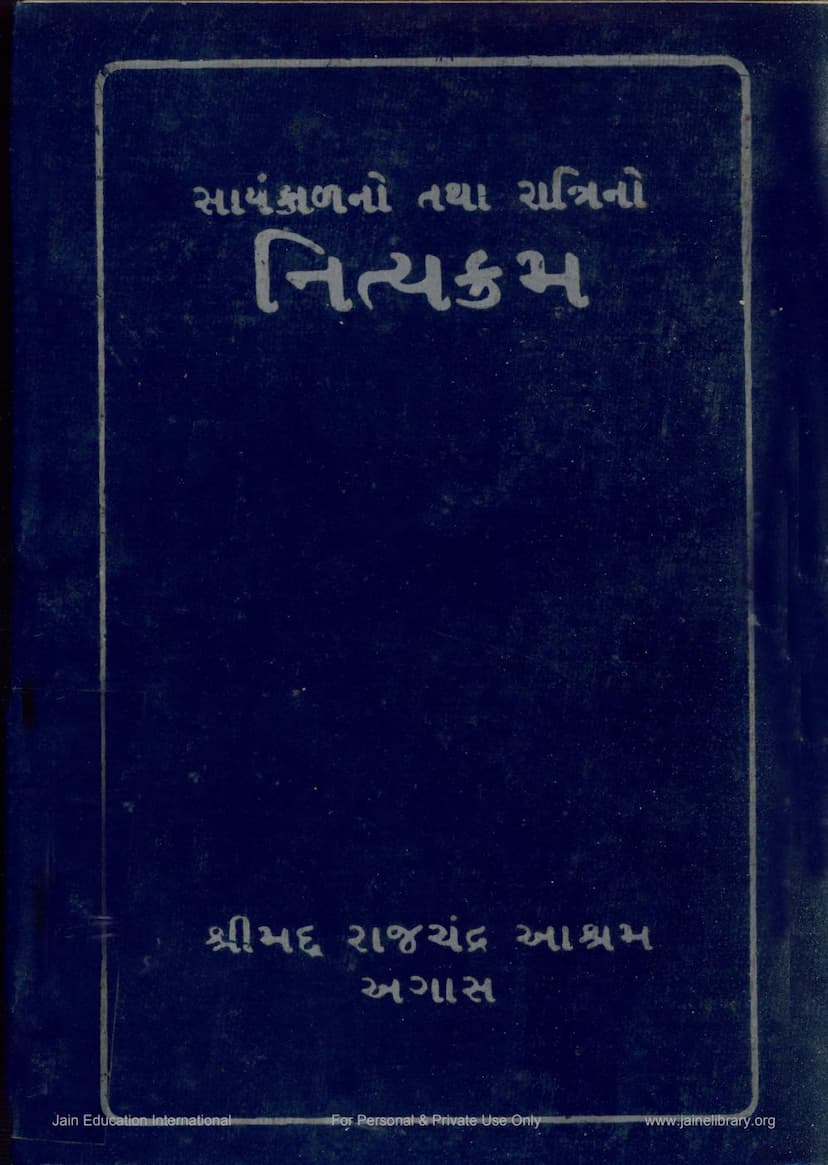Nityakram Sayankal Tatha Ratrino
Added to library: September 2, 2025

Summary
Here's a comprehensive summary of the Jain text "Nityakram Sayankal tatha Ratrino" (Daily Ritual for Evening and Night) by Shrimad Rajchandra Ashram, Agas:
This book outlines the daily spiritual practices for the evening and night according to Jain tradition, emphasizing devotion to the Guru and the path of liberation. It's a guide for personal and private use, intended to foster spiritual progress.
The text is structured as a collection of devotional verses, prayers, and teachings, primarily focused on venerating the Guru and the principles of Jainism.
Key Themes and Components:
-
Veneration of the Guru (Shrimad Rajchandra): A significant portion of the text is dedicated to praising and seeking the guidance of the Guru, Shrimad Rajchandra. He is described as the dispeller of ignorance, the bestower of true knowledge, and the one who reveals the path to liberation. Devotees express deep gratitude for his teachings and grace.
- Prayers and Salutations: The book includes numerous prayers, salutations, and invocations to the Guru, acknowledging his role as a spiritual preceptor and a guide to the ultimate truth. Phrases like "Jai Gurudev!" and various forms of Namaskar are prevalent.
- Guru's Teachings: The text highlights the transformative power of the Guru's words, which are seen as a source of spiritual awakening and guidance towards self-realization.
-
Devotion to the Divine (Jinas and Arihants): The verses also express devotion to the Arihants and other Tirthankaras (Jinas), who have achieved liberation and are considered embodiments of perfect spiritual attainment.
- Darshan (Vision of the Divine): The act of seeing the divine image is described as purifying, leading to the removal of sins, and ultimately serving as a means to salvation.
- Praise for Vitrag (Detached Beings): The text extols the virtues of beings who have attained detachment (Vitragata) and are free from worldly attachments and afflictions.
-
The Path to Liberation (Moksha Marg): The core message revolves around the Jain path to liberation, which involves understanding the true nature of the soul, shedding karmic bonds, and realizing one's pure, inherent self.
- Six Principles (Shatpad): A detailed explanation of the six fundamental principles (Atma, Nitya, Karta, Bhokta, Moksha, Mokshopay) that form the bedrock of Jain philosophy and the path to right faith (Samyakdarshan) is presented. These principles are crucial for understanding the self and the means of liberation.
- Right Faith, Knowledge, and Conduct (Ratnatraya): The importance of cultivating the three jewels of Jainism – Right Faith, Right Knowledge, and Right Conduct – is implicitly and explicitly emphasized as the path to liberation.
- Spiritual Practices: The text implicitly encourages practices like meditation, contemplation, self-inquiry, and adherence to ethical principles to overcome ignorance and attachment.
-
Praise and Devotional Songs (Bhajans and Aarti): The book includes devotional songs and prayers for evening and night, such as "Aarti" and "Mangal Deevo" (Auspicious Lamp). These are meant to foster a devotional mood and connect the devotee with the divine.
- Aarti: The Aartis are sung in praise of the Guru and the Panch Parmeshthi (five supreme beings), highlighting the stages of spiritual progress from initial realization to ultimate liberation.
- Mangal Deevo: The "Auspicious Lamp" verses symbolize the dispelling of darkness (ignorance) by the lamp of true knowledge and the guidance of the Guru.
-
Teachings on Ethical Conduct and Virtues: The text touches upon important Jain virtues like:
- Brahmacharya (Celibacy/Purity): The importance of purity and control over senses, especially in relation to desires and youthful attractions, is stressed.
- Kshama (Forgiveness): A profound prayer of repentance and forgiveness is included, expressing remorse for past mistakes and seeking liberation from the cycle of birth and death.
- Renunciation and Detachment: The verses advocate for detachment from worldly possessions, relationships, and ego.
-
Philosophical Inquiry and Discernment: The book encourages deep reflection on the nature of reality, the soul, and the means to overcome suffering.
- Distinguishing Truth from Falsehood: It emphasizes the need to discern the true path from various philosophical viewpoints and to rely on the teachings of realized souls.
- The Role of the Guru in Understanding: The text repeatedly states that true understanding of spiritual truths, especially the self, can only be attained through the grace and guidance of a true Guru.
Structure and Flow:
The book progresses through various devotional verses, prayers, and detailed philosophical explanations. It begins with evening rituals, moves to night prayers, and then delves into deeper teachings on the path to liberation and the nature of the soul. The inclusion of questions and answers between the disciple and Guru within the "Shatpad" section adds an instructive element.
Overall Purpose:
"Nityakram Sayankal tatha Ratrino" serves as a practical guide for Jain devotees to structure their evening and night spiritual practices. It aims to deepen their understanding of Jain philosophy, strengthen their devotion to the Guru and the divine, and ultimately guide them towards the ultimate goal of liberation (Moksha). It emphasizes the transformative power of correct understanding, devotional practice, and the indispensable role of a spiritual preceptor.